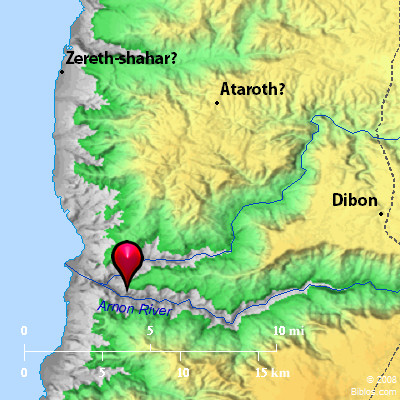Atlas  Valley of the Arnon (Arnon River) and surrounding area Maps Created using Biblemapper 3.0 Additional data from OpenBible.info Occurrences Deuteronomy 2:24 "Rise up, take your journey, and pass over the valley of the Arnon: behold, I have given into your hand Sihon the Amorite, king of Heshbon, and his land; begin to possess it, and contend with him in battle.Deuteronomy 2:36 From Aroer, which is on the edge of the valley of the Arnon, and from the city that is in the valley, even to Gilead, there was not a city too high for us; Yahweh our God delivered up all before us: Deuteronomy 3:8 We took the land at that time out of the hand of the two kings of the Amorites who were beyond the Jordan, from the valley of the Arnon to Mount Hermon; Deuteronomy 3:12 This land we took in possession at that time: from Aroer, which is by the valley of the Arnon, and half the hill country of Gilead, and its cities, gave I to the Reubenites and to the Gadites: Deuteronomy 3:16 To the Reubenites and to the Gadites I gave from Gilead even to the valley of the Arnon, the middle of the valley, and the border of it, even to the river Jabbok, which is the border of the children of Ammon; Deuteronomy 4:48 from Aroer, which is on the edge of the valley of the Arnon, even to Mount Sion (the same is Hermon), Joshua 12:1 Now these are the kings of the land, whom the children of Israel struck, and possessed their land beyond the Jordan toward the sunrise, from the valley of the Arnon to Mount Hermon, and all the Arabah eastward: Joshua 12:2 Sihon king of the Amorites, who lived in Heshbon, and ruled from Aroer, which is on the edge of the valley of the Arnon, and the middle of the valley, and half Gilead, even to the river Jabbok, the border of the children of Ammon; Joshua 13:9 from Aroer, that is on the edge of the valley of the Arnon, and the city that is in the middle of the valley, and all the plain of Medeba to Dibon; Joshua 13:16 Their border was from Aroer, that is on the edge of the valley of the Arnon, and the city that is in the middle of the valley, and all the plain by Medeba; 2 Kings 10:33 from the Jordan eastward, all the land of Gilead, the Gadites, and the Reubenites, and the Manassites, from Aroer, which is by the valley of the Arnon, even Gilead and Bashan. Encyclopedia ARNONar'-non ('arnon; Arnon): Is first mentioned in Numbers 21:24 as the border between Moab and the Amorites. "The valleys of Arnon" in the next verse undoubtedly indicate the numerous wadies contributary to the main stream. It formed the southern boundary of the land assigned to Reuben (Deuteronomy 3:12). The city of Aroer stood on the northern edge of the valley (Deuteronomy 2:36 Judges 12:2, etc.). Arnon was claimed by the Ammonites as having marked the southern limit of their territory when Israel invaded the land (Judges 11:13). They, however, had already been driven out by the Amorites, and the region north of Arnon was held by Sihon. From the inscription of Mesha on the Moabite Stone we gather that Moab had established herself on the north of the Arnon before the time of Omri. Under Omri and Ahab she was confined to the south of the river. A rebellion under Mesha was put down by Jehoram son of Ahab (2 Kings 3), and the expedition of Hazael against Israel reached the valley of the Arnon (2 Kings 10:33). But according to Mesha he regained for Moab the lost land; and this agrees with Isaiah 15, 16, where cities north of Arnon are located in Moab, e.g. Heshbon. |



